In this 2022 updated guide, I have covered the best 16 container orchestration tools and services used by many organizations in production.
Containerization solutions like Docker, Podman, and Buildah provide great flexibility to containerize and ship application code. But to have complex application deployments and infrastructure automation, you need a suitable container orchestration tool.
Container orchestration needs proper plumbing in terms of deploying applications with complex architectures. However, you will achieve faster application delivery cycles with the right set of DevOps tools.
Your containerized applications should be able to scale up and down based on application resource requirements. For this, you need a good framework for efficiently managing and scheduling the containers to meet the business requirements.
Moreover, containers are meant to be short-lived. When choosing a container orchestration tool or a managed container orchestration service, the following are the key things to consider.
- Networking
- High availability
- Ease of deployment & maintenance
- Scalability
- service discovery
- Security & Compliance
- Support (Community & Enterprise)
- Administrative overhead
Keeping the above in mind, let’s look at the best container orchestration tools.
What are the best Container Orchestration Tools?
This post covers the list of the best container orchestration tools used in production by many organizations.
1. Kubernetes
Kubernetes is an open-source, out-of-the-box container orchestration tool. It comes with an excellent scheduler and resource manager for deploying highly available containers more efficiently.
Kubernetes has become the de facto container orchestration tool for many organizations.
Survey Report: According to CNCF’s Cloud Native Landscape, there are more than 109 tools to manage containers, but 89% are using different forms of Kubernetes.
The kubernetes project is maintained by the cloud-native foundation with contributors worldwide. Contributors include big organizations to individual open source developers.
Here is the high-level architecture of Kubernetes.
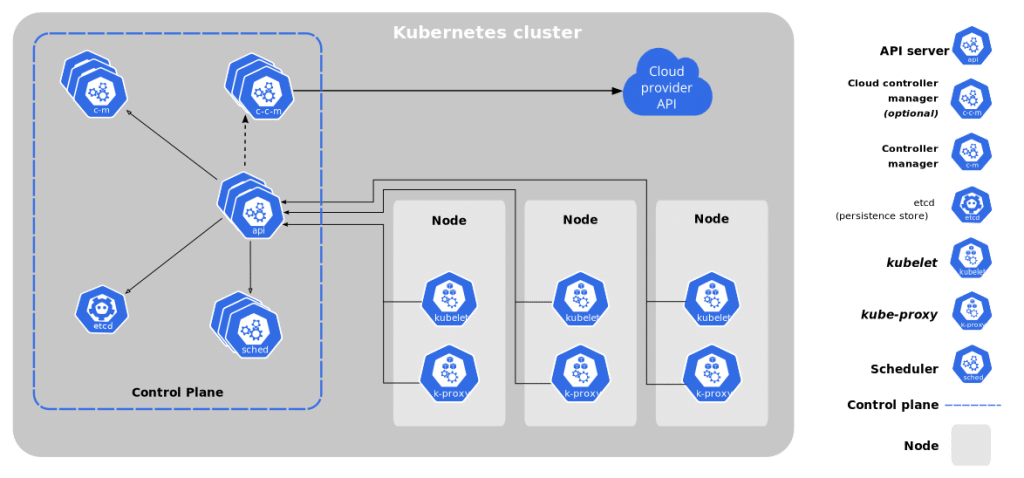
Kubernetes offers many functionalities that native docker tools don’t provide. Moreover, it is easy to get started with kubernetes.
When it comes to Kubernetes, managed services play a key role. As per Datadog’s survey on Kubernetes adoption in organizations, nearly 90 percent of Kubernetes users leverage cloud-managed services.
Also, check out our guide on kubernetes design considerations.
Important Note: Kubernetes removed Docker container run-time after version v1.20. This doesn’t mean docker images won’t work in kubernetes. It’s just that the underlying container runtime moved from Docker to runtimes that use CRI
If you would like to get started, refer to the kubernetes cluster setup using kubeadm. You can stand up a kubernetes cluster in less time without complex configurations.
2. Openshift
Openshift is built on top of kubernetes. There is a community as well as an enterprise version of Openshift.
Redhat maintains the Openshift project. Both open-source (openshift origin) and enterprise version (openshift container platform).
Along with core Kubernetes features, it offers container management and orchestration out-of-the-box features.
Here is the high-level overview of Openshift.
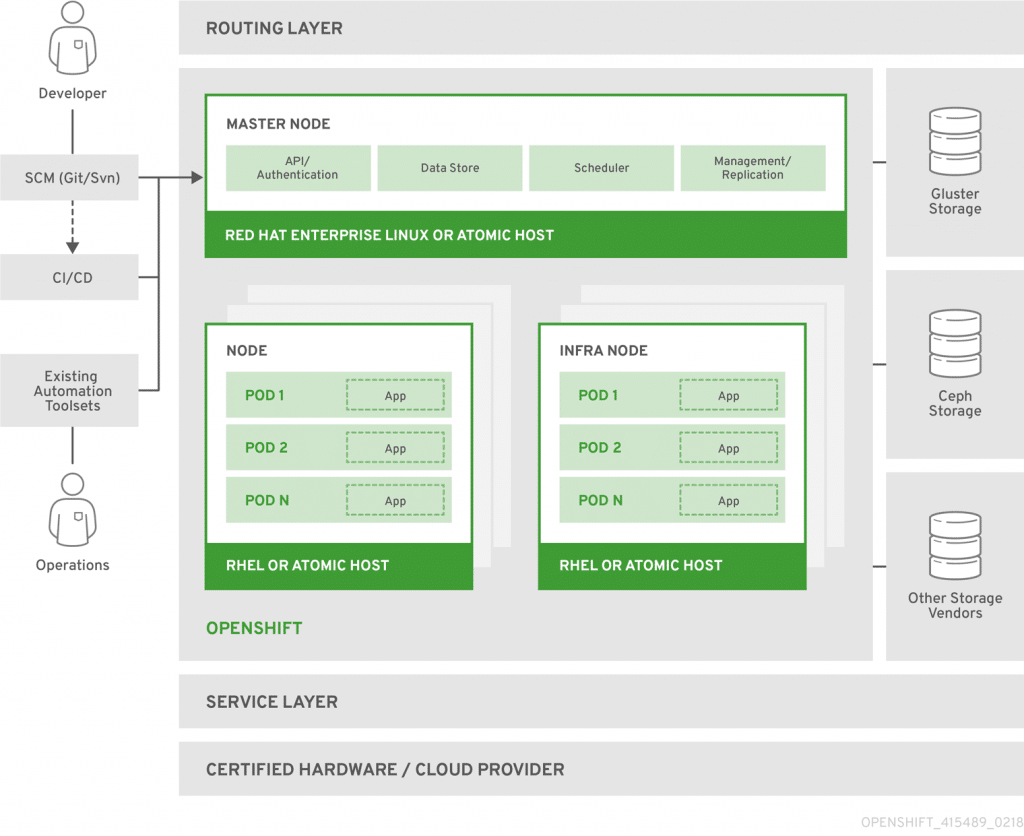
Also, Openshift is now available as a managed service on AWS cloud.
The following official image from openshift gives you an overall idea of its features.
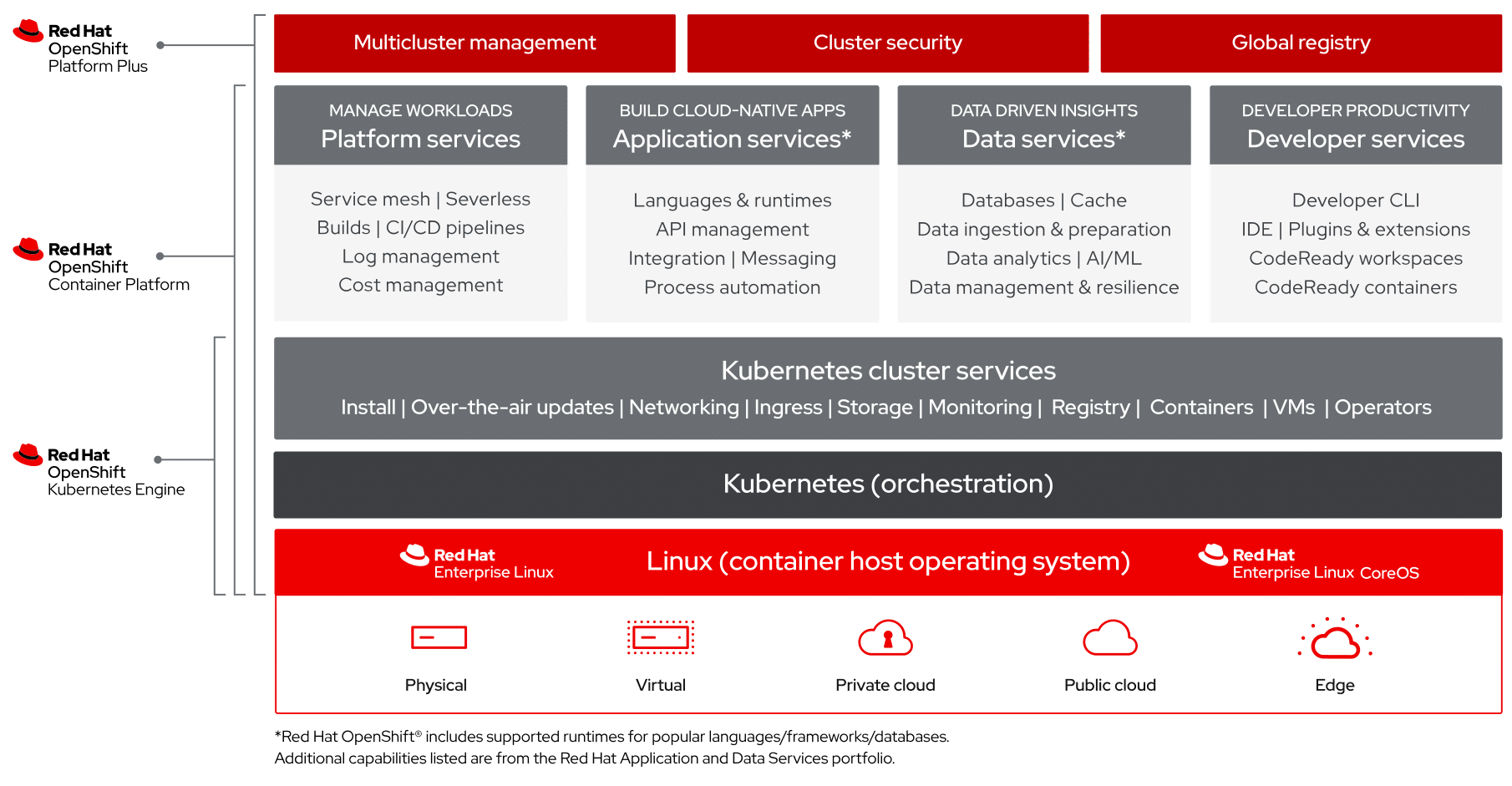
3. Hasicorp Nomad
Nomad is an orchestration platform from Hashicorp that supports containers. It shares a similar philosophy of kubernetes in managing applications at scale.
However, Nomad supports container and non-container workloads.
Nomad comes with good integration of other Hashicorp tools like Consul, Vault, and terraform.
Primary use-cases for Nomad are,
- Container Orchestration
- Non-containerized application orchestration.
- Automated service networking with Consul.
You can read about how Cloudflare uses Nomad for their dynamic task scheduling system
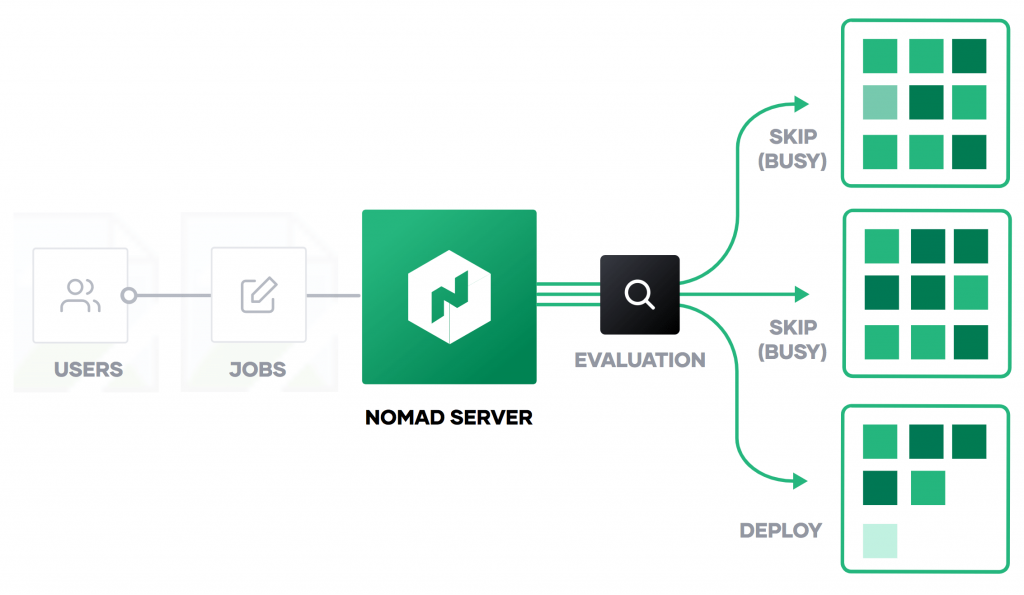
4. Docker Swarm
The Docker ecosystem consists of tools from development to production deployment frameworks. In that list, docker swarm fits into cluster management. A mix of docker-compose, swarm, overlay network, and an excellent service discovery tool such as etcd or consul can be used for managing a cluster of Docker containers.
Docker swarm is still maturing in terms of functionalities compared to other open-source container cluster management tools. Considering the vast docker contributors, it won’t be long for the docker swarm to have all the best functionalities other tools possess. Docker has documented a good production plan for using the docker swarm in production.
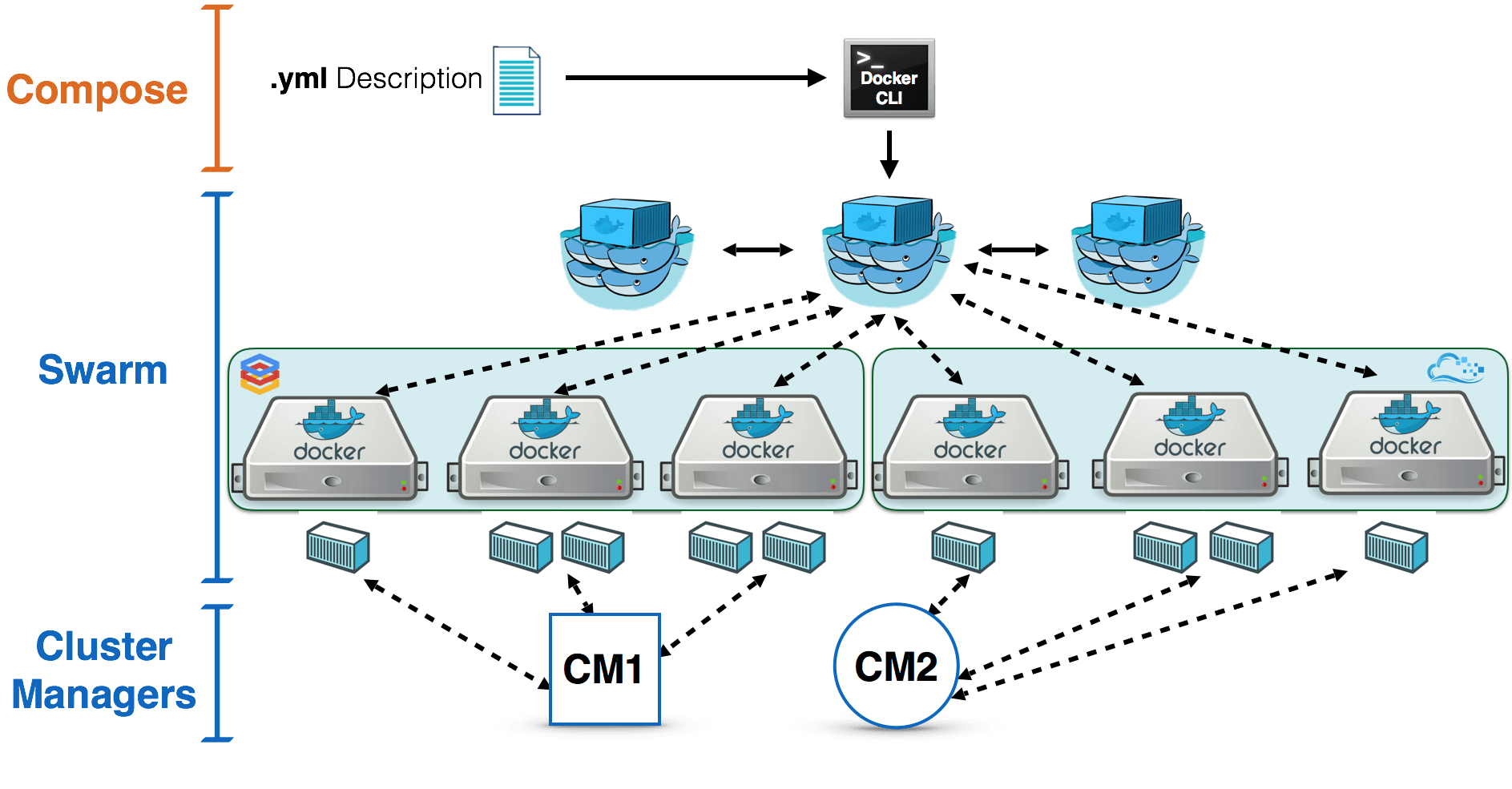
4. Rancher
Rancher is an opensource container orchestration tool. At the core, the rancher uses kubernetes as the container orchestrator.
Rancher offers the following functionalities.
- Centralized Cluster Provisioning that supports on-prem, cloud, and edge.
- Streamlined Kubernetes Operations by controlling cluster operations from a single console.
- Centralized Kubernetes Security through centralized user policies.
- Intuitive Workload Management using native kubernetes API or kubectl utility.
- Integrated Monitoring and Logging using Prometheus, Fluentd, and Grafana.
- Supports management for Amazon EKS clusters & Google Kubernetes Engine (GKE)
- Global Application Catalog to make application installation and upgrade easier.

5. Mesos
Mesos is another cluster management tool that can manage container orchestration very efficiently. It was created by Twitter for its infrastructure and then got open source. It is used by companies like eBay, Airbnb, etc. Mesos is not a dedicated tool for containers,
Mesos is not a dedicated tool for containers; instead, you can use it for VM or Physical machine clustering for running workloads (Big data, etc.) other than containers. It has an efficient Marathon framework for deploying and managing containers on a Mesos cluster.
You can also run a Kubernetes cluster on a Mesos cluster. Check out this guide for the same.
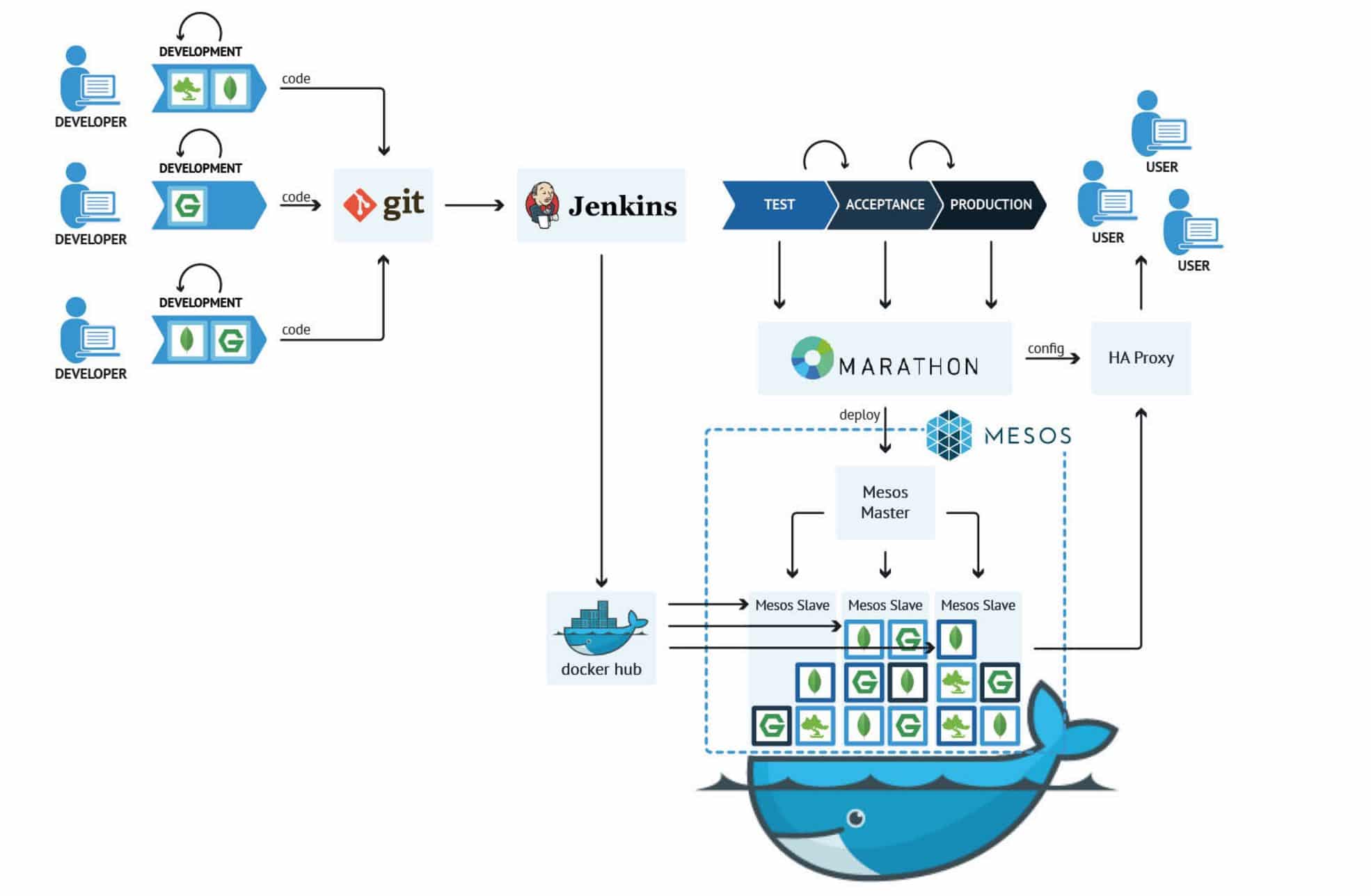
Managed Container Orchestration Tools
There are many cloud-based managed container orchestration tools that you can use to avoid complex cluster setups and administrative overhead.
Here is the list of 10 managed container services where you just have to focus on your application rather than cluster administration.
6. Google Container Engine (GKE)
GKE is a managed, highly scalable container service on google cloud. At the backend, GKE uses kubernetes, and you can use all the kubernetes functionalities on GKE. You can deploy a GKE cluster with a few clicks.
It comes with features like autopilot to reduce operations costs.
7. Google Cloud Run
Cloud Run is a managed service to run containers in a serverless way. You don’t have to create and manage a container cluster; deploy the container on cloud run, and Google cloud will scale and manage it.
8. AWS Elastic Kubernetes Service (EKS)
EKS is a managed Kubernetes cluster service from AWS similar to GKE.
9. Amazon EC2 Container Service (ECS)
ECS is a service offered by AWS for managing the cluster of containers. It is not based on kubernetes. ECS is an AWS-managed proprietary container cluster management and scheduling service. The only thing you have to worry about is the vendor lock-in.
10. AWS Fargate
AWS farmgate is a similar serverless environment for running containers. Here you can choose the backend infrastructure to be EKS or ECS. You don’t have to worry about the backend scaling, though. AWS will take care of managing and scaling.
11. Azure AKS Service
Azure Kubernetes Service is a managed highly available kubernetes service from Azure.
12. Azure Managed Openshift Service
Now public cloud providers are bringing openshift as a service. Azure has a managed Openshift service in partnership with Redhat.
13. Azure Container Instances
Azure container instances are managed serverless container deployment services like cloud run and Fargate.
14. Digital Ocean Kubernetes Service
The digital ocean offers a managed kubernetes service for deploying container-based applications. You can get free $100 credits from Digital Ocean
Following are the key features of the Digital Ocean Kubernetes service.
15. Red Hat OpenShift Online
Openshift online is one of the PaaS offerings from Redhat. You can deploy applications on the cloud with openshift using this service. You don’t have to manage the cluster as it is a pure PaaS service.
16. Linode Kubernetes Engine
Linode Kubernetes engine is a simple and easy Kubernetes setup on the Linode platform. The Following are the key features of the Kubernetes service by Linode.
- Easy Deployment of Kubernetes Clusters
- Highly available and scalable clusters.
- Easy integration with tools like Helm, Rancher, etc
- No management fee for Kubernetes.
- Complimentary Kubernetes control plane – including API, scheduler, etcd, and resource controllers.
Managed Vs. Self Hosted Container
Orchestration Tools
Choosing between managed and self-hosted container orchestration tools depends on the organization’s decision.
However, we try to put some generic advantages of managed vs. self-hosted solutions.
Following are the advantages of managed container orchestration tools.
| Advantages | Disadvantages |
|---|---|
| One-click provisioning | No control over the control plane. |
| Integration with native cloud platform services | You need to stick with the options provided by the cloud provider. |
| Less administrative overhead. | |
| High Scalability | |
| High Availability | |
| 24/7 Technical support | |
| Enterprise-grade security & Compliance | |
Following are the advantages of self-hosted container orchestration tools.
| Advantages | Disadvantages |
|---|---|
| Complete control over the platform and increased flexibility | Huge engineering effort on custom automation for cluster provisioning |
| Dedicated support team required for platform support | |
| Custom scaling setup is required. | |
| Need subject matter experts in the team to take care of design, setup, upgrade, and maintenance of the cluster. |
My advice would be to go with the managed orchestration platform unless you are trying to build a PaaS solution to cater your services to other customers.
With managed services, you can focus more of your engineering efforts on the application rather than spending time and effort on managing the platform.
Container Orchestration Tool FAQ’s
Let’s look at some of the commonly asked questions on container orchestration tools.
What is the difference between Kubernetes & Openshift?
Kubernetes is the open-source container orchestration tool maintained by the cloud-native foundation. Whereas the Openshift container platform is built on top of the Kubernetes core and maintained by Redhat.
How to choose a container orchestration tool?
There is no single answer to this question. Choosing a container orchestration tool depends on various factors such as team size, budget, available SMEs and application compatibilities, and security compliance.
Conclusion
Choosing a container orchestration tool or a service depends on your needs and the complexity of your application. Also, the service mesh adoption is increasing. Most managed Kubernetes service providers offer addons for service mesh tools like Istio.
There is no doubt that many organizations are using the tools mentioned above and services for their production workloads.
Also, if you want to look at a comprehensive list of tools that can be used in the DevOps toolchain, check out the devops tools list where I have covered 90+ best tools in different categories.
With a plethora of tools from the cloud-native foundation, it is becoming easy to manage containerized applications.
If you look at our DevOps engineer guide, containers play an important role and have covered some containers’ great insights.
Also, if you’re looking for a good open-source monitoring tool, read my reviews of the best open-source monitoring tools.

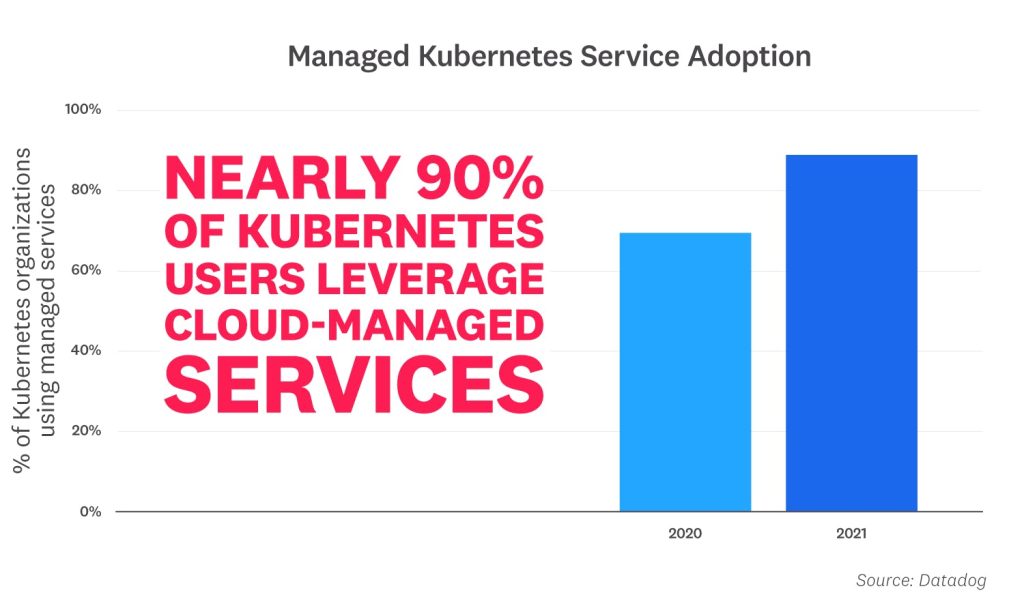

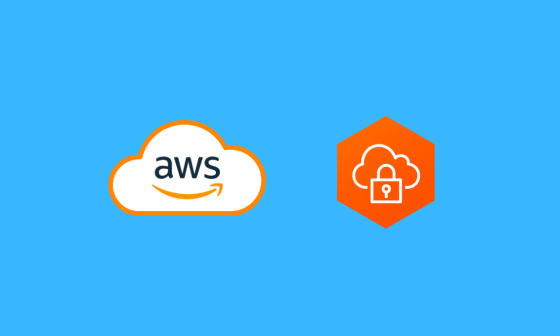
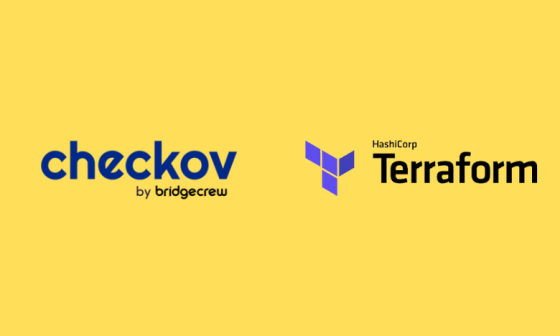




3 comments
thanks, a great overview for general idea
Very well explained article on docker. As you mentioned it depends on the nature and complexity of the application we develop. Recently we have implemented kubernetes. I will definitely share this article with my devops team.
Thanks… Waiting for the same